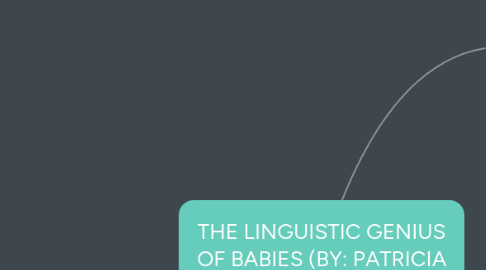
1. Patricia Kuhl states that in order to preserve a language, mothers need to speak it to their children. Language has a critical period for learning; babies and children are geniuses for acquiring a language until about the age of seven.
1.1. One thing that Kuhl firmly believes in, is that if she studies how sounds are learned, then she will also have an idea of how language is acquired.
2. The way in which Kuhl describes babies is as "citizens of the world." She describes them in this way because babies are able to discriminate any sound of any language, no matter where in the world the study is being conducted.
2.1. Adults on the other hand, are known as "culture-bound listeners." This is because we can only discriminate the language and sounds of the language that we speak; However, we are unable to recognize those of foreign languages.
2.2. Babies become "culture-bound listeners" and stop being known as "citizens of the world" before their first birthday; roughly between 10-12 months. This is due to the fact that babies take in statistics.
2.2.1. Babies listen intently to adults and as they are listening to us, they are taking in statistics. It can be more difficult for babies if the statistics of the languages are different, because babies are sensitive to statistics. For example, if they are given statistics in two different languages, like Japanese and English, it may become difficult for the babies to distinguish between the two.
2.2.2. As babies absorb statistics, their brains begin to change dramatically, which is when they make the change from "citizens of the world" to "cultural-bound listeners."
3. As adults, we no longer absorb information, like babies do, we rely completely on our memories of language, that were formed early in development.
3.1. She also discusses bilingual people, and how they must always keep two sets of statistics in mind at once. They must switch back and forth between these statistics, depending of whom they are speaking to. This lead to questions on whether babies could take statistics on a new language they had never hear before. Of course, Kuhl conducted some tests and discovered that if babies are being taught the language via a human being, that they are more than likely to learn it and take statistics from it, as opposed to receiving it from a television or sound.
3.1.1. The more research and test Kuhl conducts, the more she learns about babies and their linguistics. After conducting many tests, with the English speaking babies and exposing them to Mandarin, she realized that it does in fact, take a human being for babies to take in statistics in a better manner; babies learn a lot more when they are taking statistics in from a human being, rather than a television or just sound from a picture; having human beings talk to the babies, is the best and most effective way, to get babies to learn and/or take in statistics, on a new language.
